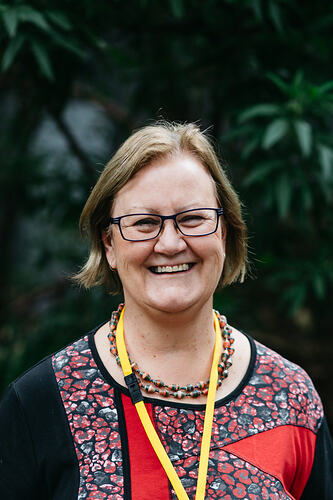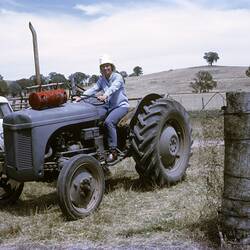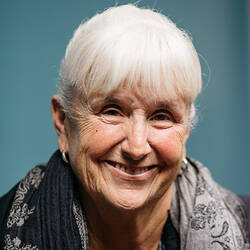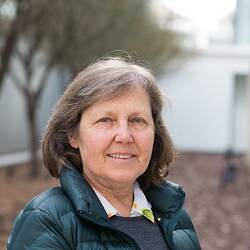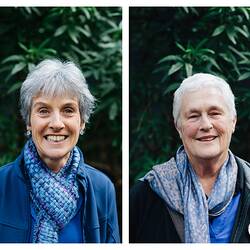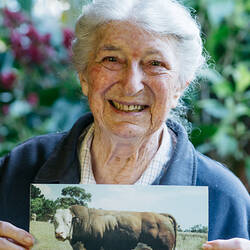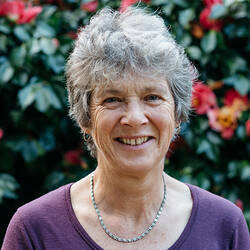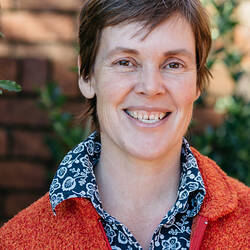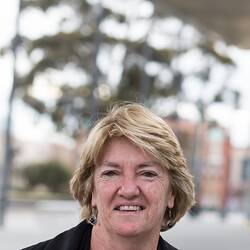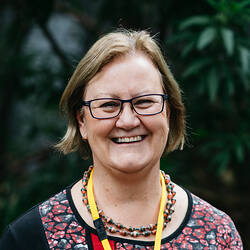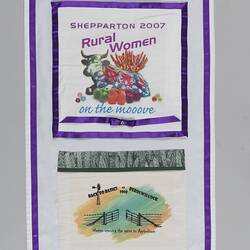Vivian McWaters contributed significantly to the Australian Rural Women's Movement of the 1980s-1990s through her work as an agricultural journalist. Vivian was among the first cohorts of female students to study agricultural science at Longerenong Agricultural College (Victoria) in the early-1970s. As a young student she lobbied the government to change an Act of Parliament so that women could live on campus at Longerenong (previously women were denied the right to live on campus). Vivian then went on to begin her career as an agricultural journalist for the Victorian state government, working with rural women's networks in the areas of agriculture, conservation and forestry.
The following excerpts were taken from an interview with Vivian McWaters for the Invisible Farmer Project recorded by Curator Catherine Forge at Melbourne Museum on 10th July 2015.
Can you tell me how you got involved with agriculture?
I didn't have any particular interest in agriculture until I got to my teenage years and I started having my school holidays with my brother and his wife on their farm in the Riverina in New South Wales. I learnt to ride a horse, though I wasn't one of those teenage girls that was besotted with horses. I simply enjoyed the farming life and so, I guess I had a bit of an interest in agriculture. By the age of sixteen I was very clear that I wanted to be an Agricultural Journalist. It could have been the influence of my mother, who was very smart but because of circumstances didn't have the opportunity to have the education that I was able to have.
Were the agricultural colleges accepting women at the time?
They had just started to accept women. I started writing to Agricultural Colleges in Australia and asking them what I needed to do to be admitted and many of them wrote back and said 'we don't accept girls, women, females.' However in Victoria Longerenong had decided to have a grand experiment with having women on campus. And so the year before I went to Longerenong, 1974, five girls started at Longerenong and they were the first girls to go to Agricultural College in Victoria, but they weren't allowed to live on campus. They had to be billeted with families in Dooen, which is the local town, because there was an Act of Parliament which said that for Agricultural Colleges - not so for Universities - but Agricultural Colleges, girls weren't allowed to live on campus.
Do you remember what the community response was to having women on campus?
Um, I guess there was, there was excitement from the boys. There was also some uneasiness about what it means to have women on campus and what it means to have women studying Agriculture, and I think there was more unease about women studying Agriculture than there was about having women on campus. I was quite adamant about women being allowed to do Agriculture so whenever I had to give a talk or a speech it was like, there goes Viv again talking about, you know, feminism and equal rights. And I can remember there being some animosity from the male students to that attitude and I think that people weren't clear that women could have a career in Agriculture. There was an expectation that women would marry farmers and support male farmers in doing what male farmers do. There wasn't the expectation that women would get careers in Agricultural research, in extension, in journalism, all the support activities that are around agriculture.
How were world events of the 1970s, such as the prevalence of feminism, impacting on you?
I think it was a really interesting era because it was pre-Gough Whitlam as well. So I can remember being at Ag College when Gough Whitlam was elected and it was interesting because my politics leaned very much to the left and most of my fellow students, their politics were very conservative, Country Party. The early seventies and mid-seventies was a time of great social change and that was impacting on the agriculture sector at the same time as it was impacting on everything else and certainly, my fellow female students were very outspoken about the role of women in Agriculture. They were certainly not about just becoming wives of farmers. Many of them didn't know what sort of career they would have in agriculture. Some of them did want to go back on the farm, some of them wanted to take over the family farm but they had difficulties with their parents because their parents said the family farm will go to the sons, not to the daughters. The daughters, in some cases, were way more suited to take over the family business than the sons who might have stayed on the farm and continued farming while the daughter went off to Agricultural College and learnt about broader agricultural issues and also the business of agriculture, economics and all those sort of things. So, there was a lot of that sort of tension in families, and in the community about the role of women in Agriculture.
Can you tell me about your foray into agricultural journalism?
I finished at Longerenong in December 1975 and I started with the Department of Agriculture, I think, in February '76. I landed in with this bunch of people who had such extraordinary wealth of knowledge and experience in exactly what I wanted to do, which was journalism. So basically I did a two-year cadetship in Journalism at the Department of Agriculture, writing about the things I wanted to write about, with people who were mentoring me and training me on the job. I couldn't have got a better start to my career. I just learnt everything there was to know about writing, journalism and production. There were very few women employed in the Department of Agriculture. Just about every event I went to was attended by nearly all men.
Was that a challenge - being one of the only female employees?
I think the main challenge early on was getting out of the office, because it was okay for a woman to be inside, in the office, but not working out in the field. It was a bit of a struggle to get permission to be allowed to go out and actually, you know, gather stories myself and actually do journalism, do writing, do research, all of those sort of things. When I was working for the Forestry Commission, I can remember sitting at my desk one day and one of the bosses from upstairs came down and said 'You went to Agricultural College?' I said 'Yeah'. And they said 'We'd like your advice because we've got so many students, and female students are graduating from Creswick at the end of this year, what should we do with them?' And I said, 'The same thing you do with the male students who are graduating'. And they said, 'But we can't do that'. 'Why?' 'Because the male students go out and work in forests'. I said 'Well the female students have just finished a qualification in Forestry, why is it that they can't go and work in the forests?' 'Well where would they go to the toilet?' was the query. I said 'Probably behind a tree, just the same as the boys go behind a tree'. So there was this huge concern about how they would manage these female graduates. As I say, that was probably part of that era of women making inroads into male dominated professions and you know, adjustments having to be made and not sure how quite to do that.
Can we talk about your work with Conservation, Forests and Lands?
When I joined Conservation, Forests and Lands, even though I didn't have direct contact with Joan Kirner initially, later on I did and she became, as she was for many women, a great mentor and supporter of what I was doing. So one thing led to another and I ended up being involved in Landcare directly and also working directly with Joan in doing publicity for Landcare. We had a decade of Landcare; we had Landcare groups forming right across the state, we had Landcare moving from Victoria and becoming national with the National Farmers Federation and the Australian Conservation Foundation in Canberra supporting the growth of Landcare. So it was exciting times to be involved in the coming together of agricultural industries with conservation and the environment, and seeing how that would play out. There were lots and lots of examples of Landcare being the glue that held those communities together and especially for the women who were in those communities, Landcare provided them with a legitimate opportunity to come together and talk about their farms, agriculture and also some of the social issues that were starting to emerge, such as mental health of farmers, youth suicide in rural communities, all of those social issues.
You mentioned that Landcare was the 'glue' keeping the communities together - what was the role for women in all this?
I think what Landcare did was to give a legitimate way for women to have a public face for agriculture. So, as we know, women have always been active in agriculture behind the scenes and not necessarily recognised, and I think Landcare groups gave them an opportunity to be a public face of agriculture in their community through either being a committee member, or taking on the traditional roles of secretary of the group. Many women became Presidents of Landcare groups and it simply gave an opportunity for women and men in rural areas to come together for a common purpose and for women to have a visible face and visible voice in those groups and in those communities - a legitimate one that was recognised, not just locally but also statewide and then nationally. So I think that was an important aspect of what Landcare was doing for women.
In what ways did you contribute to the Rural Women's Movement of the 1980s-1990s?
I'd say I played a role in supporting the movement, both from promoting the movement, so my background in Agriculture and Journalism and my capacity to write stories about Landcare and to write those stories from the perspective of people, so with a human face. I was certainly supporting the movement by seeing Landcare as part of this grand spectrum of change that was happening in the Agriculture and Conservation sectors at the time and recognising that however it was wrapped up, whether it was women on farms or whether it was a Water Watch group or whether it was Junior Landcare , it was all part of that mixture and it was all contributing to that greater knowledge of Agriculture and Conservation, and the greater recognition of what people were doing, and giving women a greater voice and a greater profile in that whole sector.
More Information
-
Keywords
Agriculture, Farming, Rural Women, Rural Industry, Rural Victoria, Women's Associations, Conservation, Sustainable Agriculture, Women's Movement, Gender Roles
-
Localities
-
Authors
-
Contributors
-
Article types
